

💧 What is Glycerin?
Glycerin (also spelled glycerol) is a naturally occurring polyol compound found in all lipids known as triglycerides. In skincare, it functions primarily as a humectant — a moisture magnet that draws water into the outer layer of skin (stratum corneum) from the environment and deeper skin layers.
Glycerin can be derivedfrom 1)Plant oils (soy, coconut, palm), 2)Animal fats, 3)Synthetic processes (petroleum-based or fermentation)
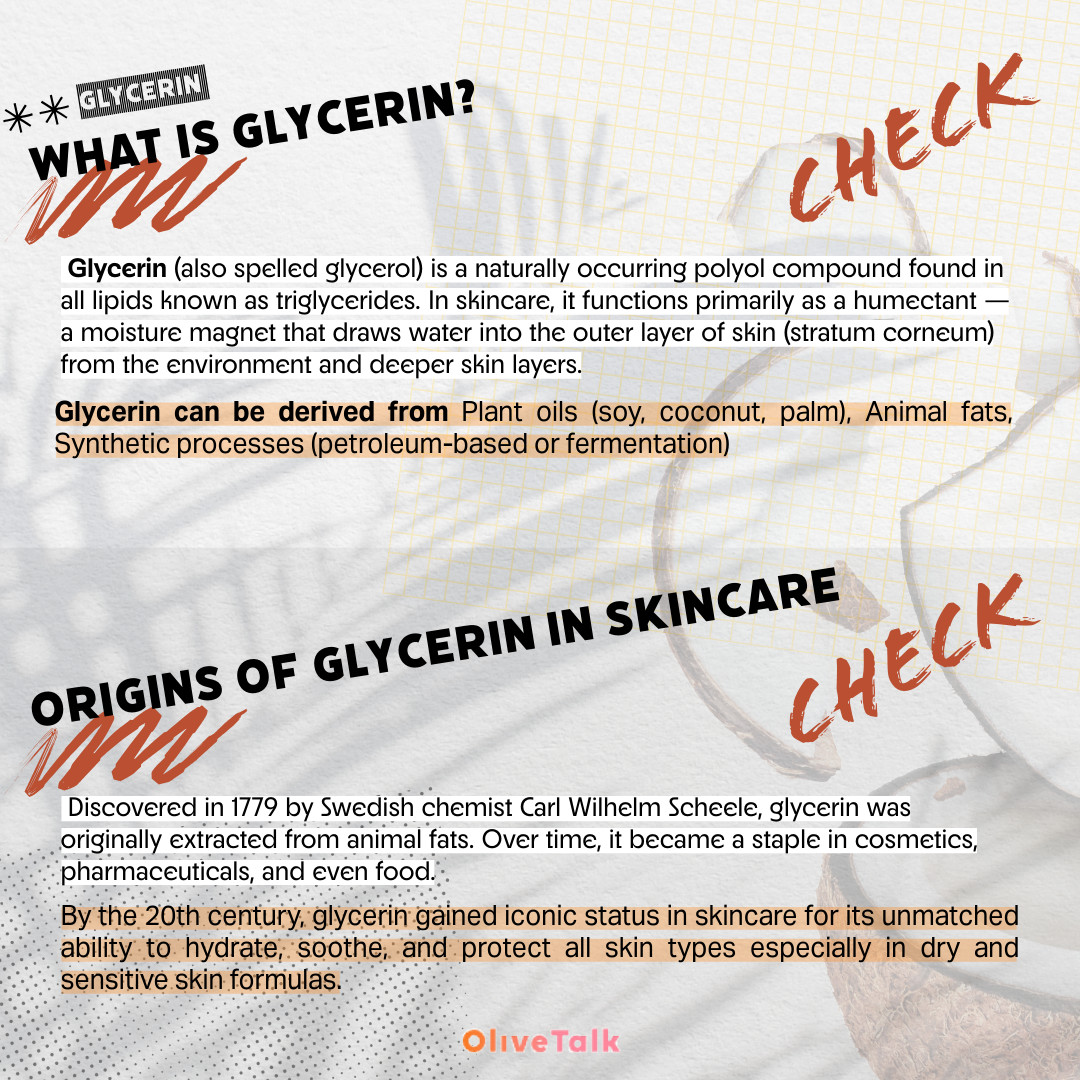
🌿 Origins of Glycerin in Skincare
Discovered in 1779 by Swedish chemist Carl Wilhelm Scheele, glycerin was originally extracted from animal fats. Over time, it became a staple in cosmetics, pharmaceuticals, and even food.
By the 20th century, glycerin gained iconic status in skincare for its unmatched ability to hydrate, soothe, and protect all skin types especially in dry and sensitive skin formulas.
🔍 Glycerin vs. Other Humectants (What's the Difference?)
(Property / Glycerin / Hyaluronic Acid / Urea)
Molecular Size / Small (92 g/mol) / Large (500k–1M g/mol) / Small (60 g/mol)
Water-binding / High / Very High / Moderate
Penetration Depth / Deep / Primarily surface / Deep
Additional Function / Barrier support / Plumping, smoothing / Mild exfoliation
Irritation Risk / Very low / Low to moderate / Moderate (high % use)
※ Glycerin is the most versatile and well-tolerated humectant, offering deep hydration without stickiness or irritation.
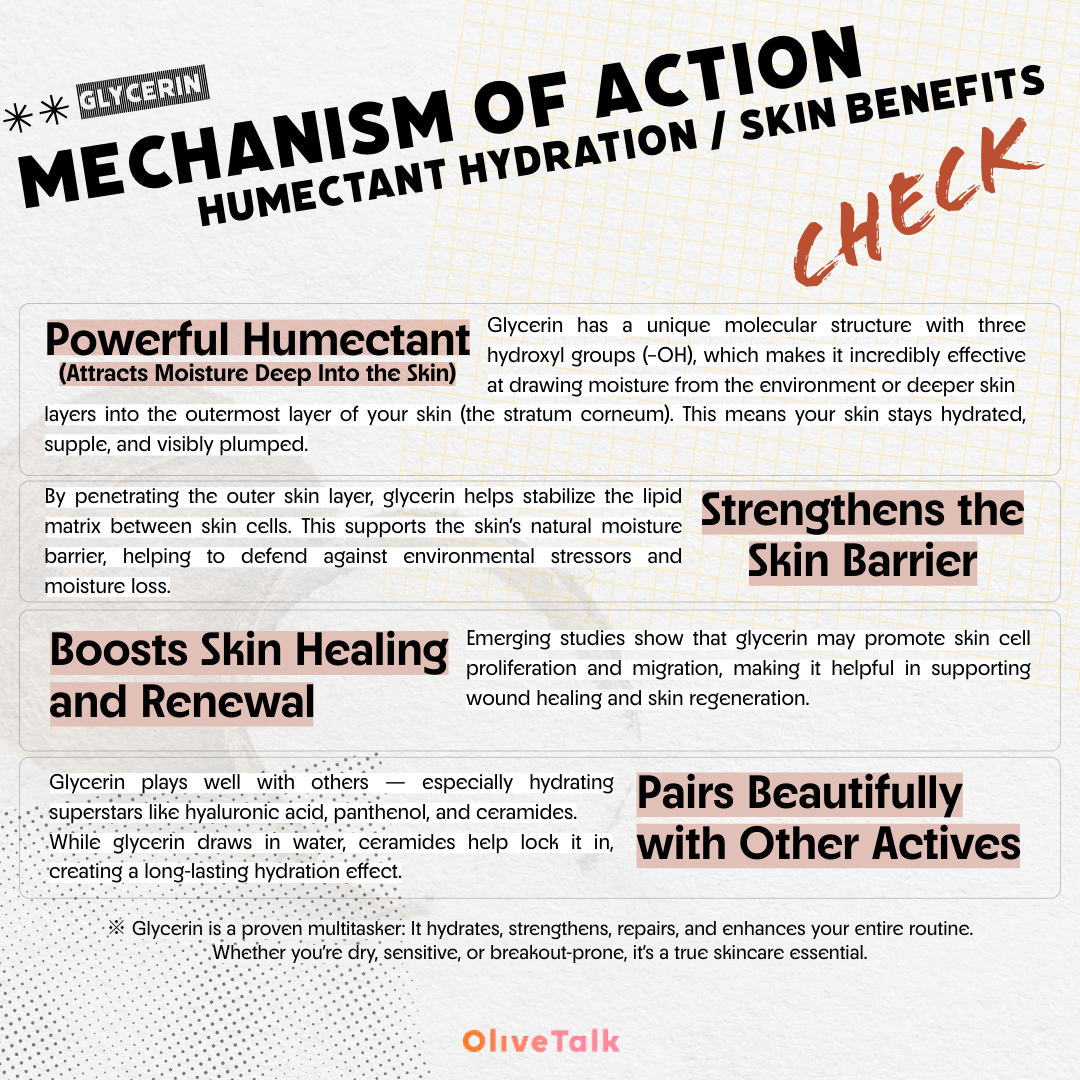
🔬 Mechanism of Action I (Humectant Hydration)
Glycerin works by
- Drawing water from the air and lower skin layers to the stratum corneum
- Binding water molecules to improve skin hydration
- Supporting lipid organization in the skin barrier
- Enhancing the efficacy and penetration of other ingredients
💡 Mechanism of Action II (Skin Benefits)
- Deep, long-lasting hydration
- Prevents dryness and flaking
- Soothes irritation and boosts barrier resilience
- Helps maintain skin elasticity and smoothness
- Aids recovery from atopic dermatitis, eczema, and psoriasis
- Safe for all skin types including babies and sensitive skin
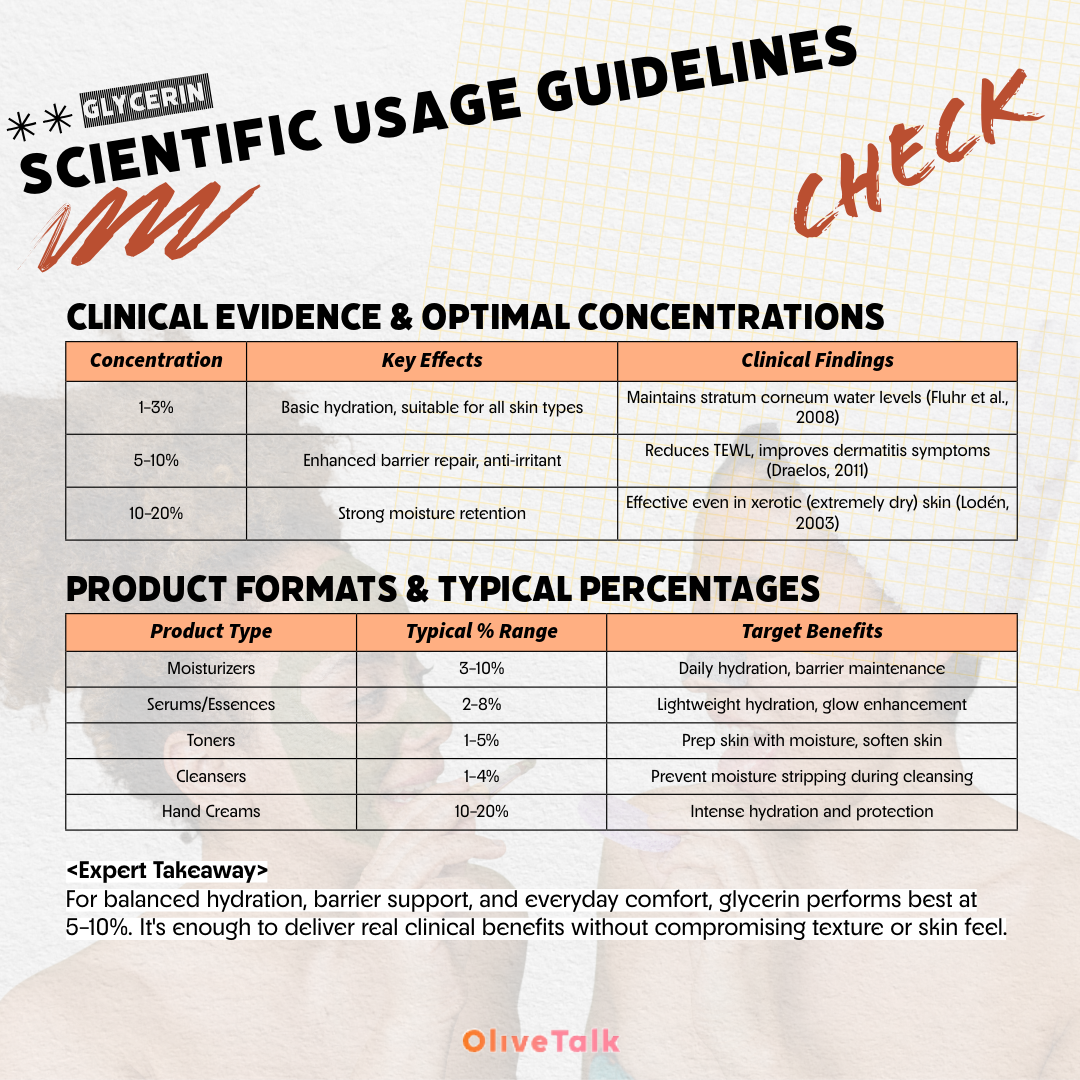
🧪 Clinical Evidence & Optimal Concentrations
(Concentration / Key Effects / Clinical Findings)
1–3% / Basic hydration, suitable for all skin types / Maintains stratum corneum water levels (Fluhr et al., 2008)
5–10% / Enhanced barrier repair, anti-irritant / Reduces TEWL, improves dermatitis symptoms (Draelos, 2011)
10–20% / Strong moisture retention /Effective even in xerotic (extremely dry) skin (Lodén, 2003)
🍶 Product Formats & Typical Percentages
(Product Type / Typical % Range / Target Benefits)
Moisturizers / 3–10% / Daily hydration, barrier maintenance / Serums
Essences / 2–8% / Lightweight hydration, glow enhancement
Toners / 1–5% / Prep skin with moisture, soften skin
Cleansers / 1–4% / Prevent moisture stripping during cleansing
Hand Creams / 10–20% / Intense hydration and protection
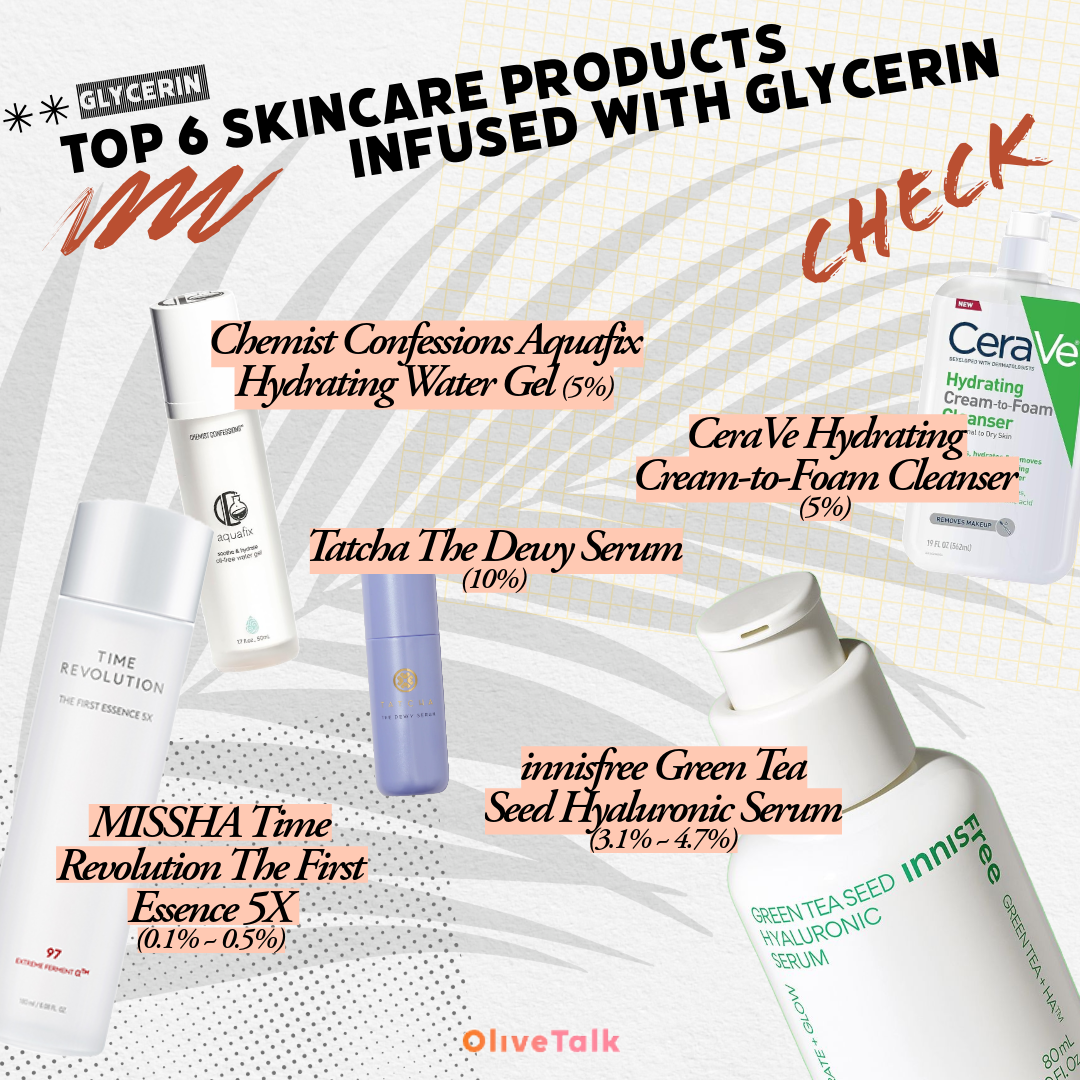
<Top 5 Skincare Products Infused with GLYCERIN>
1. innisfree Green Tea Seed Hyaluronic Serum
GLYCERIN Content : 3.1% ~ 4.7%
Country : KO
2. MISSHA Time Revolution The First Essence 5X
GLYCERIN Content : 0.1 ~ 0.5%
Country : KO
3. Chemist Confessions Aquafix Hydrating Water Gel
GLYCERIN Content : 5%
Country : US
4. Tatcha The Dewy Serum
GLYCERIN Content : 10%
Country : US
5. CeraVe Hydrating Cream-to-Foam Cleanser
GLYCERIN Content : 5%
Country : US
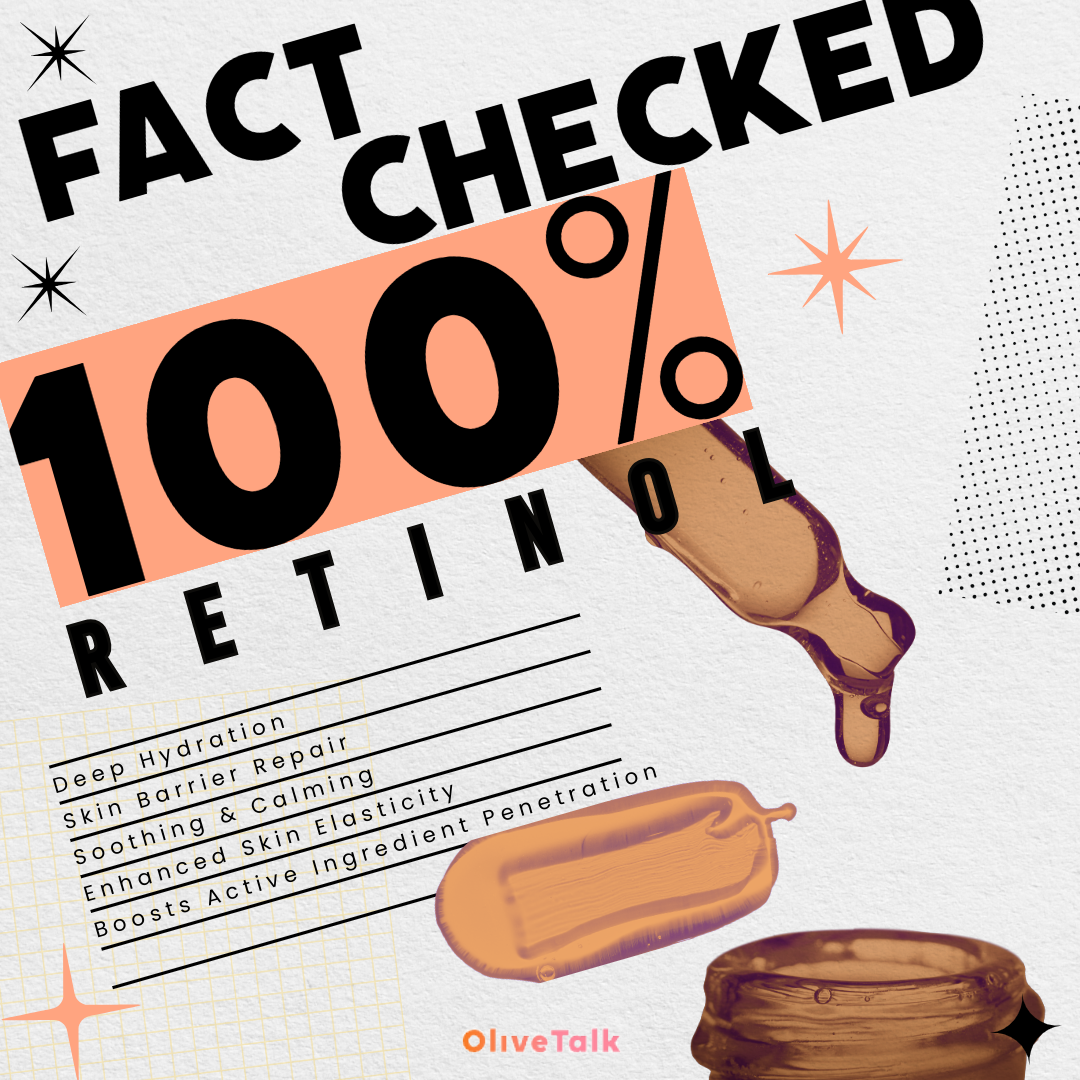
🧬 Historical Note: From Soap Byproduct to Skincare Staple
Originally a byproduct of soap-making, glycerin’s journey from chemistry lab to skincare essential has been nothing short of iconic. With its ability to hydrate even the driest skin without clogging pores or triggering irritation, glycerin has earned its place as a universal moisturizer.
💾 Final Thoughts from a Skincare Expert
Glycerin is the gold standard for everyday skin hydration. It’s affordable, effective, and scientifically proven to improve skin function at every level. Whether you have dry, sensitive, acne-prone, or even eczema-prone skin glycerin belongs in your skincare routine.
📚 References
Fluhr, J. W. et al. (2008). Glycerol and the skin: holistic approach to its origin and functions. British Journal of Dermatology, 159(1), 23–34.
Draelos, Z. D. (2011). Glycerin: its role in cosmetic formulations. Dermatologic Therapy, 24(2), 132–135.
Lodén, M. (2003). The clinical benefit of moisturizers. Journal of the European Academy of Dermatology and Venereology, 17(6), 663–668.
Proksch, E. et al. (2008). Moisturizers: Structure, function and selection. Clinical Dermatology, 26(6), 633–640.
Rawlings, A. V., & Harding, C. R. (2004). Moisturization and skin barrier function. Dermatologic Therapy, 17(Suppl 1), 43–48.
 54Comments
54Comments
HA - better at hydration, smoothing but a bit risky to get irritation
Glycerin - mighty low risky, still good at hydration but can feel it boring.
I’m currently using a toner with glycerin and a serum with HA, just want to make sure I’m not messing with absorption or causing dehydration somehow!